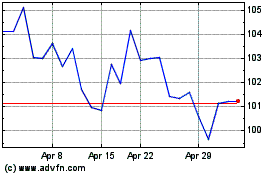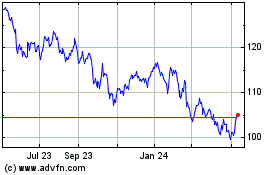Nestlé to Buy Medical-Device Firm -- WSJ
September 02 2016 - 3:03AM
Dow Jones News
By Saabira Chaudhuri
Nestlé SA has struck a deal to buy a U.K.-based maker of a
device to treat dysphagia, a condition in which people have
difficulty swallowing, marking its latest medically focused
investment.
Terms of the deal to buy Phagenesis weren't disclosed, but a
person familiar with the acquisition said medical-device makers of
Phagenesis's size typically sell for GBP100 million ($131
million).
Phagenesis makes an electrical stimulation device designed to
restore the neurological control of swallowing by kick-starting the
reorganization of the brain. The device is aimed at treating
swallowing difficulties commonly experienced by post-stroke
patients, but also by elderly patients and people that have been
put on mechanical ventilation in intensive-care units.
Nestlé estimates dysphagia occurs in 29% to 55% of stroke
patients, with 15 million people world-wide suffering a stroke
every year.
The company already sells foods tailored to people with
dysphagia as part of its health-science business, which also makes
a range of other foods and supplements for conditions including
depression and cancer. While Nestlé's focus so far has mainly been
on medical foods, it does sell certain medical devices to help
patients ingest its food through tubes.
The deal is Nestlé's latest investment in the area of health
sciences, a business that investors and employees say could be a
game-changer.
Earlier this year Nestlé signed a deal to help U.S. biotech
company Seres Therapeutics Inc. develop products aimed at restoring
bacteriological balance in the digestive system. It also bought a
stake in Pronutria Biosciences Inc., a Cambridge, Mass., startup
developing amino-acid-based products to treat muscle loss. Last
year, Nestlé said it would collaborate with General Electric Co.'s
health-care arm to monitor nutrition for patients in intensive-care
units.
The world's largest packaged-foods company recently named Ulf
Mark Schneider, chief executive of Germany-based health-care
company Fresenius SE to be its next chief executive, a move that
has been seen to underscore its focus on health and nutrition.
Nestlé will make an upfront payment to buy Phagenesis followed
by funding in stages based on the successful completion of clinical
development programs in Europe and the U.S., which it said is
expected by 2019.
Manchester-headquartered Phagenesis, which was formed in 2007,
said it has developed the only treatment for neurogenic dysphagia
based on pharyngeal electrical stimulation, treating the cause
rather than just the symptoms. Chief Executive Reinhard Krickl in
an interview said traditional treatments for dysphagia that focus
on speech therapy take weeks or months to work, while Phagenesis's
more revolutionary approach takes days.
The U.K. company's investors include London-based Inventages
Venture Capital -- which is largely funded by Nestlé -- and
London-based Anglo Scientific.
The device is sold in the U.K., Austria and Germany but not
currently in the U.S. Phagenesis's revenue wasn't disclosed, but
totals less than GBP1 million a year, according to a person
familiar with its accounts. The company's main focus has been on
proving that there is a market for its product, which it sells to
hospitals.
"Dysphagia is a strategic focus for Nestlé Health Science," said
Greg Behar, CEO of the Nestlé unit. "This innovation can bring a
new dimension to swallowing rehabilitation that can be
transformational from a patient and health-care-professional
perspective."
Write to Saabira Chaudhuri at saabira.chaudhuri@wsj.com
(END) Dow Jones Newswires
September 02, 2016 02:48 ET (06:48 GMT)
Copyright (c) 2016 Dow Jones & Company, Inc.
Nestle (PK) (USOTC:NSRGY)
Historical Stock Chart
From Mar 2024 to Apr 2024

Nestle (PK) (USOTC:NSRGY)
Historical Stock Chart
From Apr 2023 to Apr 2024
